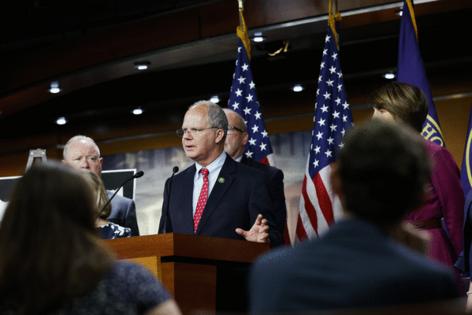Reconciliation text would rescind energy, environment funding
Published in Political News
WASHINGTON — The House Energy and Commerce Committee would target a wide range of Biden administration climate programs while advancing Republican goals for oil and natural gas in its portion of reconciliation text.
The committee is scheduled to begin its markup Tuesday of legislative text that includes energy and environment subtitles. The budget resolution told the panel to find savings and new revenue totaling at least $880 billion.
A preliminary estimate from the Congressional Budget Office distributed by Democrats found that the energy, environment and communications subsection would reduce the deficit by at least $197 billion over the 2025 to 2034 period. The health care subtitle would reduce the deficit by at least $715 billion over the same period, the estimate said.
Included in the energy subtitle are provisions that would rescind funding from the 2022 reconciliation law that backers dubbed the Inflation Reduction Act. This includes clawing back all unobligated balances from that law for the Energy Department’s Loan Programs Office, funding for interstate and offshore wind transmission, and energy efficiency training grants to states.
The text would create a $1 million user fee, which, once paid, would require the Energy secretary to deem an application for a permit to export to a non-free-trade agreement country in the public interest. A 1978 law requires such a public-interest finding to move the project ahead.
The committee’s provisions would also allow applicants for natural gas infrastructure projects to pay $10 million or 1% of a project’s projected capital cost, whichever is less, to receive expedited permitting, which would be blocked from judicial review. And they would expand the law to allow carbon dioxide, hydrogen and oil pipelines to pay the fee and receive the same consideration.
The text would appropriate $10 million to establish a De-Risking Compensation Program at the Energy Department to compensate sponsors of federal permitted energy projects for unrecoverable costs in the event a permit is revoked or denied. This program would be for coal, critical mineral, oil, natural gas or nuclear projects valued at at least $30 million.
It would provide $2 billion to the Energy Department in fiscal 2025 for the Strategic Petroleum Reserve, including $218 million for repairs to caverns and $1.3 billion for the acquisition of petroleum. All remaining funds would be used to buy back equivalent amounts of petroleum as those mandated to be sold in the 2017 GOP reconciliation law.
The environment subtitle would repeal and rescind IRA funding for low-emission heavy-duty vehicles, air pollution reduction at ports and near schools, diesel emissions reduction, environmental and climate justice block grants, and hydrofluorocarbon emissions reduction.
It also would rescind grants offered through the Greenhouse Gas Reduction Fund. The EPA has been locked in litigation over the grants.
The text wouldn’t rescind the IRA’s methane fee for oil and gas companies, but delay it by a decade. President Donald Trump had already signed into law a joint resolution blocking the implementation of the Biden administration rule outlining this fee.
The text includes sections repealing EPA tailpipe standards and corporate average fuel economy standards for model years 2027 and later. Many Republicans and even some Democrats have questioned the standards amid concerns they are effectively electric vehicle mandates.
The section-by-section summary released by the committee didn’t estimate the budgetary effects of repealing energy and environment rules. Other committees have also included language repealing rules in their reconciliation titles, saying there is a budgetary effect.
Democrats say this doesn’t meet the requirements of reconciliation and could be removed from a final bill when it reaches the Senate.
©2025 CQ-Roll Call, Inc., All Rights Reserved. Visit cqrollcall.com. Distributed by Tribune Content Agency, LLC.




























































Comments